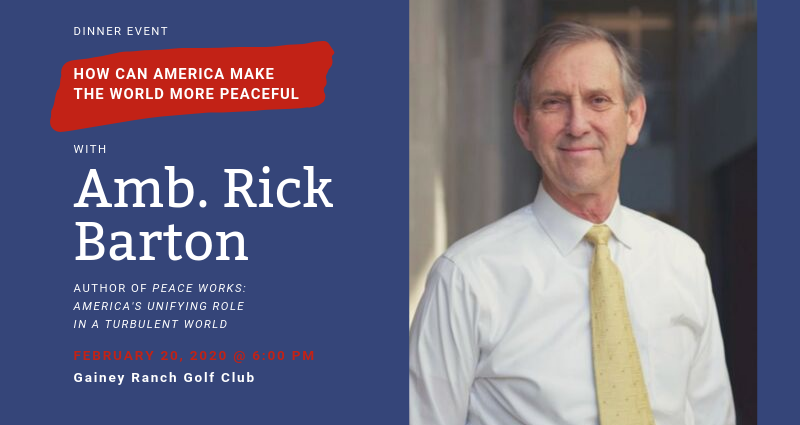
Dinner Event
How America Can Make the World More Peaceful
>> Listen to Ambassador Rick Barton talk about international affairs and America's role in a turbulent world on Valley Business Radio in Phoenix, Arizona
Schedule
Thursday, February 20, 2020 | 6:00-8:30 pm
Cocktail Reception: 6:00-6:45 pm
Dinner: 6:45-7:30 pm
Program: 7:30-8:30 pm
Discussion with Ambassador Barton will be moderated by Dirk Dijkerman.
Venue
Gainey Ranch Golf Club
7600 E Gainey Club Dr
Scottsdale, AZ 85258
Registration
Early-Bird Rate through February 9
Standard Registration: $55
Standard Registration (Non-Member): $70
After February 9
Standard Registration: $65
Standard Registration (Non-Member): $80
Table (up to 8 attendees): $600

Book Signing
Ambassador Barton will be signing copies of his book, Peace Works: America's Unifying Role in a Turbulent World.
The book will be available for purchase at the event in hardcover for $35 + $3.01 in tax.
Review of Peace Works:
America's Unifying Role in a Turbulent World
By G. John Ikenberry, Read it in Foreign Affairs
Part memoir and part scholarly study, this book provides one of the most thoughtful reflections yet on U.S. interventionism and peacemaking since the end of the Cold War. Drawing on his years as a diplomat, Barton argues that although the United States has stumbled badly in humanitarian interventions, it should not abandon the task but rather go about it in new ways, working with local groups and staying in the background. Barton draws specific lessons from several recent U.S. interventions. In Bosnia, the United States created incentives for people to collaborate by supporting local institutions that cut across ethnic divides. In Rwanda, after the genocide, aid to women in the countryside encouraged small steps toward peace. After the 2010 earthquake in Haiti, the lesson was to direct economic assistance to local civic leaders who had the trust of the wider public. In the future, states will continue to fail or collapse into civil war, and ethnic violence will continue to sprawl across poor regions of the world. Barton’s message to American decision-makers is to be humble and patient and to stay as close as possible to the people at the bottom of society.
About Ambassador Rick Barton
Ambassador Rick Barton teaches at the Woodrow Wilson School at Princeton University, where he serves as a co-director of Princeton’s Scholars in the Nation’s Service Initiative and Ullman Fellowships. His 2018 book, Peace Works: America's Unifying Role in a Turbulent World, uses a mix of stories, history, and analysis to offer an affirmative approach to foreign affairs through concrete and attainable solutions. Barton started USAID’s Office of Transition Initiatives, and was America’s ambassador to the Economic and Social Council of the United Nations in New York, the UN’s Deputy High Commissioner for Refugees in Geneva and the first Assistant Secretary of State for Conflict and Stabilization Operations. He led conflict management initiatives in over 40 crisis zones across the globe, from Haiti, Iraq, Nigeria, Burma, Pakistan to Turkey. Published in The New York Times, the Washington Post, Politico, The Boston Globe, and numerous other international outlets, Barton is a guest on news shows ranging from NPR to all of the major networks. He resides in Washington, D.C. with his wife of 43 years, Kit Lunney.
Discussion with Amb. Barton
Moderated by Dirk Willem Dijkerman
Dirk Dijkerman served for over thirty years at the U.S. Agency for International Development (USAID), The World Bank, the U.S. Department of State, the U.S. National War College and the Organization for Economic Cooperation and Development (OECD). His most recent government positions include Executive Coordinator for USAID’s Ebola Task Force for the West African outbreak, Special Advisor at the OECD for defining its first-ever organization-wide Strategy on Development and the U.S. Government Representative to the Development Assistance Committee (DAC) at the OECD. In this later capacity, he also served as the U.S.’s lead negotiator to the Fourth High Level Forum on Aid Effectiveness, which agreed upon steps donor and recipient signatories committed to taking to improve the quality of international aid and its impact. Responsibilities at USAID and the Department of State included acting Assistant Administrator for the Bureau for Democracy, Conflict and Humanitarian Assistance; the first Chief Operating Officer in the State Department’s Office of the Director of U.S. Foreign Assistance, and Deputy Assistant Administrator in USAID’s bureaus for policy and planning and for Asia and Near East affairs. Overseas, he served as USAID Mission Director in the Republic of South Africa, Rwanda, and the regional mission covering East and Southern Africa. He also has served on the Advisory Board to Korea’s International Cooperation Agency (KOICA) and has consulted to Arizona State University. Dirk obtained his Ph.D. at Cornell University and retired from USAID as a Career Minister in the Foreign Service.
